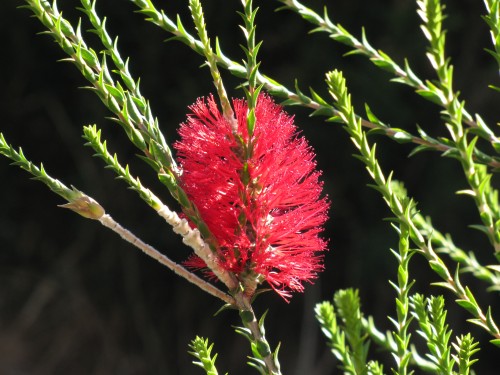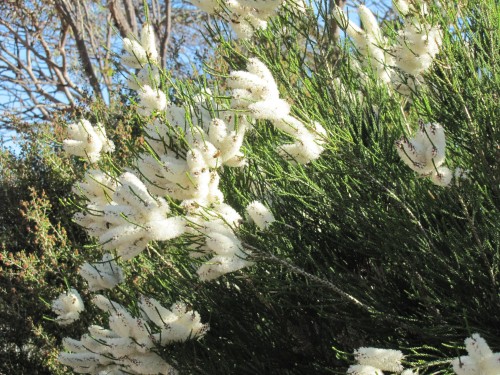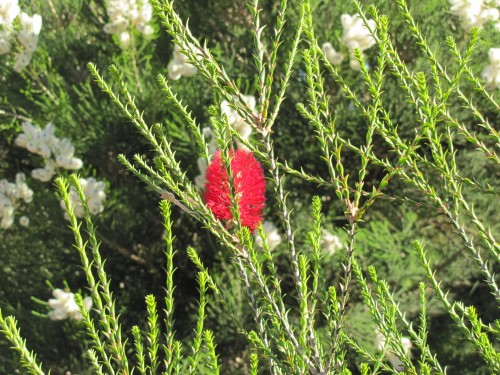Attracting birds to your garden
No bird photos to show today, but something just as beautiful. I recently took these photos of some native flowers in our garden. It made me think about ways of attracting birds to your garden. I’ve written articles on this topic before, including this one.
Planting Australian native plants is the best way of attracting – and keeping – birds in your garden. This rule can be applied in most parts of the world; find out what local plant species grow in your area and add them to your garden.
In Australian gardens, plants like grevilleas, hakeas and banksias will not only look delightful when flowering, the honeyeaters, finches and many other species of birds will love them – and you. You can learn more about Australian native plants on my wife’s site here.
Providing clean drinking water is another sure way of attracting birds. In our hot, dry summers the birds will flock to a bird bath, dish or bowl put out for them. Place the water containers near a window or glass door so you can watch the parade of birds without scaring them.
One more tip: keep your cat inside. They are hunters and have no place in the Australian environment.
The importance of bird baths
Quite a few of the photos shown on this site are of birds at one of the bird baths we have in our garden. Providing water by means of a bird bath is one of the most effective ways of attracting birds to your garden – and keeping them coming back.
Near the end of spring here in Australia is an ideal time to add a bird bath to your garden. The days are warming up and the hot weather is on the way. Our native birds appreciate a reliable source of water. Installing one or more sources of water is also an excellent way of observing our birds close up.
On this morning’s gardening show on ABC radio here in South Australia (Adelaide 891) the host Jon Lamb interviewed a guest speaker on the principles to follow with bird baths. I took some written notes and share them here:
Acclimatisation:
It will take some weeks for the birds in your garden to get used to a new structure in your garden. Now is the time to install it, knowing that by the time the really hot weather comes the birds will be used to it. Our bird baths have been in place now for four or five years, so our resident birds are quite used to it. Within minutes of adding water they are there enjoying themselves. Two weeks ago I added another just outside my office window; so far only 2 species have visited it.
Hygiene:
Birds use the same water they bathe in to also drink from, so it is important to regularly clean the bird bath. Change the water every few days adding fresh water. If the bath becomes stained, scrub it clean but use no chemicals doing so. In fact, it is probably wise to scru each bird bath at least fortnightly; weekly if you can.
Depth of water:
Most of the smaller birds that will come to your bird bath will not be strong swimmers. The bird bath must be shallow, or have shallow areas so if a bird gets into trouble it can safely get out. Steep sides are to be avoided. I have placed a small brick or stone in each of our baths, and the birds use this for perching on when using the bath, or drinking.
Location:
Choosing the right location for a bird bath is essential. You can have one out in the open and it will be used, but it is far better to locate it near thick shrubbery, so the birds can quickly escape if a predator like a hawk is hovering nearby. They feel much more secure if they have a quick escape route and will therefore be happier about using your bird bath. It is also suggested that you choose a shady spot as the water can get very hot and uncomfortable on very hot days if it is in full sun.
Enjoyment:
We get a great deal of enjoyment watching the passing parade of birds coming to drink and bathe. We consider sitting in our sun room watching the birds is a “good” waste of time, right up there with taking time to “smell the roses’. In addition to the location considerations I’ve already mentioned, locate one of your bird baths where you can see it from a room in your house, or perhaps a veranda or pergola area. This will give you countless hours of enjoyment of our feathered friends.
Ponds:
More ambitious gardeners may incorporate a pond to provide water for the birds. If the water is deep, be sure to provide shallow parts, or add a log partly in the water, or stones or pebbles for the birds to perch on without the danger of drowning.




